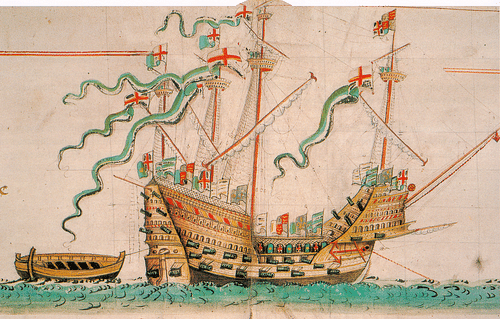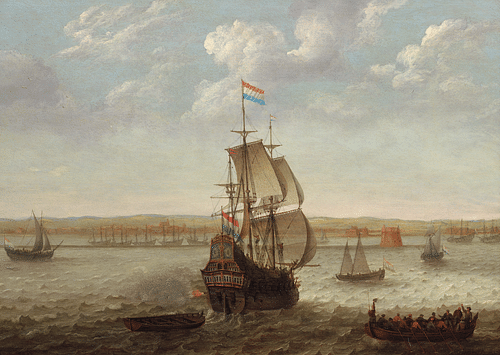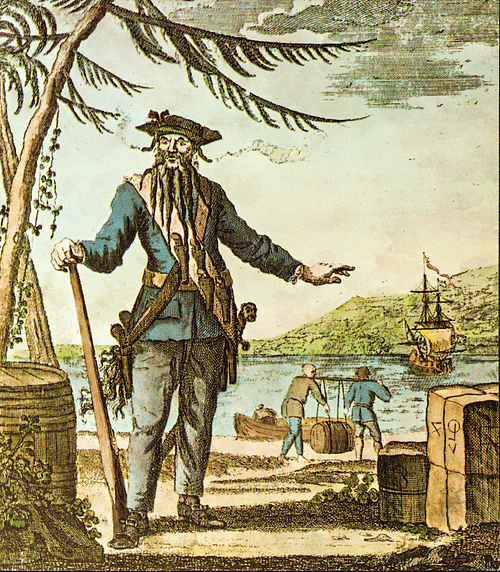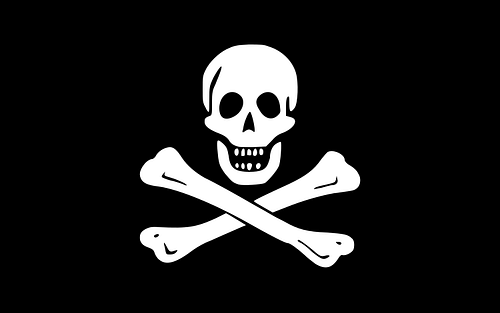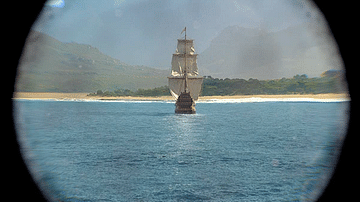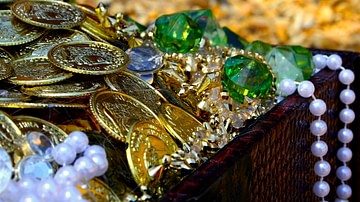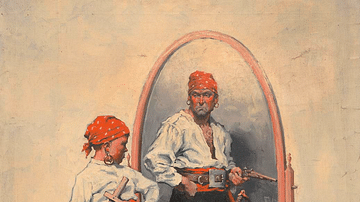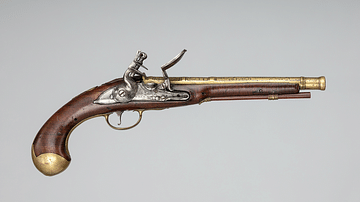Pirates, especially those of the so-called Golden Age of Piracy (c. 1690-1730), are particularly famous for their pithy expressions which relate to all things nautical, general roistering, and life of crime on the High Seas. There is even an international 'Talk Like a Pirate Day' on 19 September, when landlubber romantics can indulge their fantasy of a life more glamorous than the one fate has bestowed upon them. In this article, we examine some of the more common expressions and slang terms that pirates, and mariners in general, have been credited with, where they came from and what they really meant.
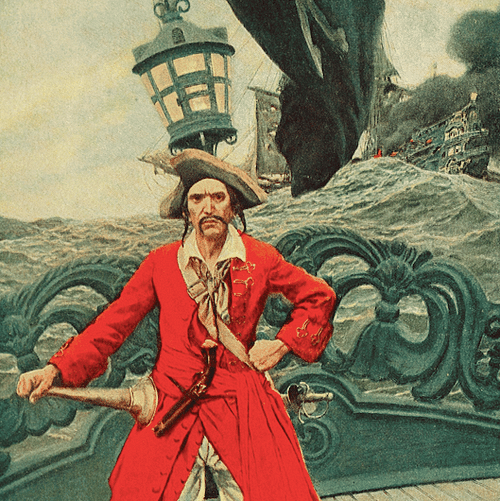
Above Board
Meaning "legitimate" since if a ship’s crew were all visible above decks it was unlikely they were pirates, who often hid below decks when approaching another vessel.
Ahoy!
Used from the 18th century to attract attention, for example, the sighting of a ship, but later to simply mean "hello there".
Ant’s Bollock on a Beach
A slang term used in the Royal Navy to mean something is very difficult to find.
Archpirate
Used since antiquity to refer to a pirate who commands a fleet of vessels.
A Soft Farewell
When a ship which was part of a pirate fleet departed secretly at night from the others to avoid sharing out booty.
Avast!
In use from the 17th century, it was a command to stop a particular action like pulling on rigging to hoist a sail.
Bear Up
To keep the ship’s bow away from the wind. An expression that was then used to mean "remain cheerful".
Belay!
Used from the 16th century, this meant to wrap a rope around a fixture like a cleat to secure it. In slang, it came to mean "stop what you’re saying" or, as "Belay that yarn!", to mean "stop those lies!"
Between the Devil and the Deep Blue Sea
Used nowadays to mean one has only two poor choices, but "devil" actually referred to the first and longest beam of a ship’s keel (so called because it was the most difficult to access and clean when in dock). Therefore, the expression meant there is nothing between the ship and the sea.
Bite the Bullet
An expression meaning to face something unpleasant. The expression comes from the habit of a flogged sailor biting on a real bullet so that he did not cry out and bring ridicule from his crewmates.
Bitter End
The end of the anchor rope which was attached to a wooden post or bitt on the ship. To "reach the bitter end" was, therefore, to pay out all of the anchor rope and reach the limit. "In deep water" and "at one’s rope’s end" have the same meaning.
Blooding and Sweating
A form of torture used by pirates such as making a captive run between a line of sailors who pricked them with sail needles and then shutting the victim inside a barrel full of cockroaches. A less unsavoury version was to make a victim run endlessly around the main mast encouraging them with the point of a cutlass until they collapsed from exhaustion.
Blow Me Down!
Not documented, but an expression used in pirate fiction to signify surprise or shock.
Blue Monday
This refers to the common practice in the Royal Navy of dishing out punishments like floggings on a Monday.
Blues
To feel down, this expression likely derives from the practice of a ship flying a blue flag when its captain, commander, or an officer has died at sea. Some ships painted a blue line on their hulls instead of raising a flag.
Bombed
Meaning "drunk". The term comes from a leather jug known as a bombard which was used to store up to 8 pints (4.5 l) of beer or ale. Consequently, "bombarded" also meant "drunk".

Booty
The goods captured, which were then distributed, often surprisingly fairly amongst the pirate crew. Typically only divided at the end of a voyage after sale, an extra share was given to those who had suffered injuries.
Brethren of the Coast
A name given to pirates of the Caribbean (although they themselves never used it).
Bring your Arse to Anchor
Meaning to sit down.
Bumboo
A common drink for pirates of the Caribbean, made from rum, water, sugar, and nutmeg.
Castoffs
Unwanted land clothes and old ropes left on shore before setting sail.
Catgut Scraper
Slang for the ship’s fiddler.
Cat-O-Nine-Tails
A long whip in use from the 16th century to maintain discipline on board ship. It was made of nine lengths of rope attached to a single length with a wooden handle. Each of the nine 'tails' had at least three knots in them to make the whip even more likely to damage its victim. Often, if the whipper was not deemed vigorous enough, he risked being whipped himself, and to ensure the blows were always powerful, the whipper was changed every 12 strokes.
Chock-A-Block
Meaning "packed with people" but deriving from the occasion when two rigging blocks are so close together that the ropes are at their limit and the sail can no longer be manoeuvred.
Clean Slate
Meaning all is well and ready to start anew. It derives from the practice of writing navigational readings and the occurrences of a watch (period of 24 hours) on a slate board. When the watch ended and the information was noted in the logbook by the captain or an officer, the slate was wiped clean.
Crack On
To make good speed. The term derives from the cracking noise made by ropes and sails made taut by a strong wind.
Cut and Run
The practice of cutting the anchor cable with an axe rather than hauling it on board, done to save time and make a quick departure from a risky situation. To "cut loose" has the same meaning, while "cut to the chase" is similar in that rigging was hastily cut to make sails ready as fast as possible to pursue another vessel.

Davy Jones’ Locker
An expression first used in the mid-18th century to refer to the sea where the souls of dead mariners are collected by the evil spirit Davy Jones. Jones keeps the souls in his locker, which is any sea or ocean and not a particular place. The expression has no connection with the English pirate David Jones.
Dead Men Tell No Tales
A phrase attributed to pirates (without any evidence) to mean that murdered captives could not bear witness to an act of piracy. Most pirates through history did not kill their victims but either left them alone, recruited them, or sold them as slaves.
Deck Cargo
Naval slang for a woman’s breasts.
Deep Six
Waters greater than six fathoms in depth (36 ft / 11 m). It may refer to throwing things overboard and was the minimum depth for burials at sea, hence it became a euphemism for committing a corpse to the sea. Nowadays, it has come to mean "dispose of" in general.
Doubloon
The largest gold coin (just under an ounce) minted by the Spanish for use in Spain and colonies in the Americas from the 16th century.
Down the Hatch
To put cargo through the hatch and into the hold. The expression was used as a toast when drinking alcohol.
Dressing Down
The unpleasant task of re-waterproofing sails while they were fully rigged. The expression came to mean to receive a reprimand.
Fag End
The tattered ends of an old rope, used to refer to a cigarette butt or the remains of anything of not much value.
Fifteen Men on a Dead Man’s Chest
A pirate song invented by Robert Louis Stevenson for his 1883 novel Treasure Island. The lines are:
Fifteen men on the dead man’s chest
Yo-ho-ho, and a bottle of rum!
Drink and the devil had done for the rest.
The chest in the song is not a box of treasure but the small island Dead Man’s Chest (now called Dead Chest Island) in the British Virgin Islands.
First Rate
The top rating or class of naval ships, typically those with more than 100 cannons on board.
Flake Out
The practice of laying an anchor flat on deck so that it could be easily thrown overboard without entangling the anchor rope. The expression came to mean lying down exhausted or failing to keep to an appointment or commitment.
Footloose
When a sail is left free and untied at its bottom edge. The expression came to mean "free to do what one wishes" since one has no ties or responsibilities. Often followed by "and fancy-free" for emphasis.
Foul Up
Meaning the anchor rope has become entangled. Nowadays the expression means to make a mistake or to ruin something.
Freeze the Balls off a Brass Monkey
Not quite as rude as it sounds, the 'monkey' was a brass metal tray on which iron cannonballs were neatly stacked in a pyramid. In cold temperatures, the different metals reacted differently and the pile of balls might shift about.
From the Seas
This was a typical pirate’s answer to the question "where are you from?" and was given to conceal their identity. It might also be given by pirate ships when entering a port for the same reason. In use from the 17th century.
Get Into a Flap
Meaning "to become unnecessarily hurried or anxious". The expression comes from the flapping of signal flags in the Royal Navy. If many messages had to be sent, then there were many flags and a great deal of flapping.
Get Hitched
Slang meaning "to get married", the term originally meant joining two ropes together. To "get spliced" has the same literal and figurative meaning.
Gingerbread Work
A slang term for the decorative gilding on exterior parts of a ship. It derives from the practice of German bakers putting gilding on their ginger biscuits.
Give a Wide Berth
Meaning "to anchor the ship safely away from another vessel" and so, by extension, to generally mean to deliberately avoid something.
Going on the Account
In use from the 16th century, this meant that no wages would be paid to a pirate crew until booty had been taken and shared out.
Goose Without Gravy
A slang term to refer to a badly injured man who showed no sign of bleeding.
Grog
In the first half of the 17th century, mariners in the Royal Navy were served pure beer, but this was later replaced by pure rum. Admiral Edward Vernon, whose nickname was Old Grogram, decided to dilute the rum with water in 1740 and so the weaker drink became known as grog. The name came to be applied to any alcoholic drink. Pirate captains likely did not water down drinks and gave their men anything available such as beer, wine, and gin, if rum were not available.
Grommet
First used in the 16th century, the term comes from the Spanish grumete and was pirate slang for a ship’s boy or apprentice.
In Consort
When two or more pirate vessels agreed to split booty even if they were in the meantime separated.
Keelhaul
A severe punishment that involved tying a person with rope, throwing them overboard, and then dragging them either under the ship from one side to the other or along the length of the ship.
Keep Aloof
To keep the ship pointed to the wind when on a lee shore and so prevent it from being shipwrecked against the land.
Kick the Bucket
If a hangman’s scaffold or ladder were not available then the person about to be hanged stood on a bucket until it was kicked away from under their feet.
Land Ho!
The cry uttered by a lookout on the first sight of land.
Lubber
Also "landlubber", a term first used in the 14th century which referred to anyone who was clumsy, stupid, or unemployed. Mariners used the term for someone not familiar with nautical tasks or life at sea in general.
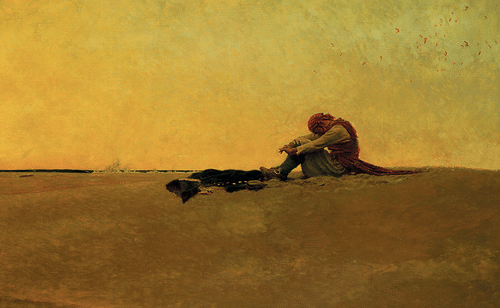
Maroon
To deliberately leave a mariner without help, typically on a small uninhabited island. Pirate captains were known to maroon troublemakers, deserters, cowards, and thieves, usually leaving them without provisions or even clothes. An alternative to leaving the person on land was to set them adrift in a small boat with no oars. The threat of thirst and starvation meant some men preferred to be killed outright rather than be marooned. Some victims were given a pistol so that they could shoot themselves. The most famous mariner to be marooned was Alexander Selkirk (1676-1721), albeit by choice, in the Pacific on the Juan Fernández Islands in 1704. Selkirk inspired Daniel Defoe’s novel Robinson Crusoe.
Marooner
From the Spanish word cimarrónes, which referred to an escaped slave in the 17th century. Marooner was applied to Caribbean pirates in the same period.
Mate
In use from the 14th century, a mate is a fellow crew member, co-worker, comrade-in-arms or a person one simply spends a lot of time with. It is also the title of an officer on both merchant and naval ships charged with looking after the stowage of cargo, organising the daily tasks of the crew, and who ensured the captain's or other officers' orders were obeyed.
Matelot
A much more involved relationship than mate (see above) where two men lived together, ate together, shared their possessions, and looked after each other during battles and illness. The term was in use from the 17th century but comes from the French word which signified two mariners who always ate together. This type of relationship was particularly common in pirate havens.
Nightingale
A derogatory term applied to a sailor who cried out in pain when being flogged, which was taken as a lack of guts and courage.
No Purchase, No Pay
An expression first used in the 16th century that meant a pirate would receive no reward unless booty were taken, 'purchase' being an archaic term for plunder. The expression survives in modern marine salvage where "no cure, no pay" means the vessel must be first successfully salvaged before crews are paid.
Peg Leg
A nickname used from the 15th century for a mariner who had lost part of his leg and used a wooden substitute. Also the name of the wooden leg itself. Long John Silver of Robert Louis Stevenson’s Treasure Island is the most famous fictional example (at least in films since in the book he is described as having only crutches), but there were several real pirates with a wooden leg, most notably the Dutch captain, the rather splendidly named Cornelis Corneliszoon Jol (d. 1641).
Picaroon
A 17th-century slang term for a buccaneer, privateer, or pirate in the Caribbean, derived from the Spanish word picarón, meaning "pirate".
Pieces of Eight
Another name for the peso, a Spanish silver coin widely accepted as currency in the 17th, 18th, and 19th centuries in the Americas, and which was worth eight silver reales. The figure ‘8’ stamped on these coins is the origin of the dollar ($) sign. Mariners sometimes cut the peso into eight pieces for smaller transactions and two of these pieces became known as "two bits", a term later used in US coinage.
Pillage
This was the custom of pirates to take anything from a captured vessel which was not part of its recognised cargo (which would be shared as booty). Essentially, pillage was, unless stipulated in the ship’s articles (see below), a free-for-all where passengers and anyone else aboard were relieved of their valuables such as rings, necklaces, and fine clothes. Generally, anything above decks was regarded as suitable for pillage.
Plate
Meaning "silver", from the Spanish plata. It could refer to silver coins or ingots and under maritime law came to mean treasure of any kind.
Pull Your Finger Out
An expression meaning to stop hesitating and start something, which comes from the habit of sailors putting their finger in the powder hole of a cannon until it is ready to fire.
Purchase
A slang term in use from the 13th century to refer to both the act of piracy (or theft in general) and the booty taken by pirates.
Prize
A vessel captured by buccaneers, privateers, and pirates, from the Latin pretium.
Sail Under the Black Flag
To be a pirate, that is part of a ship which raises a black flag like the Jolly Roger to warn other vessels they must surrender or face violent consequences.
Scrape the Bottom of the Barrel
To use a knife to extract the last fatty contents of a pork-filled barrel. The grease was often saved by the cook and sold at the end of the voyage to candlemakers and tanners. His reserve of this fat or slush was his "slush fund". Nowadays, the expression is used to mean being obliged to use the lowest quality of anything.
Scurvy
Now more familiar as the name for the disease caused by a deficiency of vitamin C, but from the 15th to 17th century, this was a scathing insult which conveyed utter contempt of a person.
Sea Dog
Originally used for the privateers of Elizabethan England but extended to mean any mariner with long experience at sea.
Ship’s Articles
The code by which mariners and pirates lived on a particular vessel or with a particular captain. Many captains insisted their crew hold a Bible, swear their obeisance of the articles, and sign them with their name or mark if they could not write.
Shiver Me Timbers
An entirely fictional pirate expression first used in Robert Louis Stevenson’s 1883 novel Treasure Island to mean surprise or shock, as if one’s ship had hit rocks and the timbers of the hull are shattered.
Sling Your Hook
An invitation to an unpopular seaman to hook his hammock elsewhere. Nowadays used to mean "go away, you are not wanted".
Sloppes
The baggy trousers, worn by mariners of all kinds, which closed below the knee but above the ankle. It later came to mean foul-weather clothing which was similarly baggy.
Splice the Main Brace
Originally this referred to repairing a key element of the ship’s rigging, the main brace, and, as this was a difficult job, the crew were often given rum or grog afterwards. As a consequence, the expression came to mean "serve out the drinks".
Swab
The name of a rope mop used by mariners to wash or 'swab' the decks. "Swab" and "swabber" were used as pithy insults from the 16th century meaning a person is the lowest of ranks (since deck swabbing was their humble duty onboard).
Take Down a Peg or Two
Meaning to reduce a person’s rank or reduce their inflated opinion of themselves. The expression derives from the practice in the Royal Navy of hanging ranking flags or standards from the mast. If a more senior office came aboard, the previously highest ranked flag was taken down one peg and the new flag put above it.
Talk Bilge
Meaning to talk nonsense. It derives from the filthy bilge water in the lower parts of a ship.
Walk the Plank
A form of execution that involved blindfolding a prisoner, tying their hands behind their back, and making them walk along a plank positioned from the deck to hang out over the sea. The prisoner was encouraged to proceed with a cutlass point or by being shot at. There are no reliable historical cases of this ever happening, but it is a beloved part of pirate fiction, nevertheless. The idea may derive from 1st-century BCE Cilician pirates who, according to Plutarch (c. 45 - c. 125 CE), made Roman captives walk along a ladder on water.
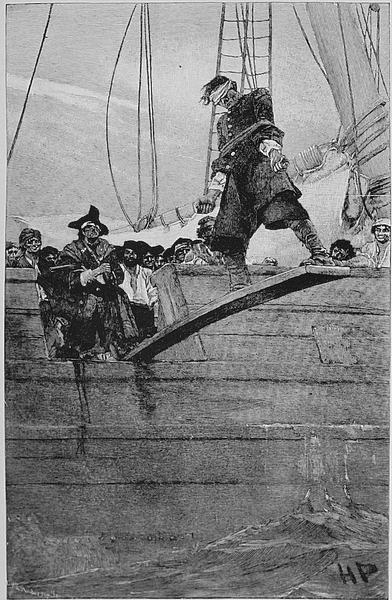
Wench
A term used from the 13th century to refer to a woman, often a prostitute, although it was not originally an insult. Rather, a wench was someone warm-hearted. In pirate fiction, it is often used as a euphemism for a prostitute.
Where away?
A question meaning "in which direction?" and usually uttered in response to a lookout sighting land or another ship.
Yo-Ho-Ho
A fictional pirate expression with no particular meaning that first appears in Robert Louis Stevenson’s 1883 novel Treasure Island. It may derive from the phrase "Yeo heave ho" which mariners chanted while pulling on rigging.

